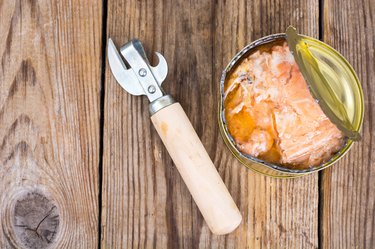
If you'd like to enjoy salmon's many nutritional benefits, but don't always have time to cook from scratch, consider adding canned salmon to your diet. You'll enjoy high-quality protein and other nutrients, and you won't have to worry about quick spoilage or a short shelf life.
Tip
Aim to add two to three servings of salmon to your diet weekly. Four ounces is considered an adult serving of this healthy protein, states the U.S. Food & Drug Administration.
Video of the Day
Health Benefits of Canned Salmon
Canned salmon is a versatile food that lends itself well to lunches, camping trips and other on-the-go scenarios. Domestic canned salmon is available in sockeye, pink and chum varieties, states Delaware Sea Grant.
Video of the Day
You'll enjoy numerous nutritional benefits from consuming this healthy fish. For starters, salmon is a top-notch source of protein and heart-friendly omega-3 fatty acids.
Along with other types of canned fish, salmon offers several additional benefits, notes the Alaska Historical Society. Unlike widely available fresh salmon fillets, the canned variety contains healthy fish oil, as the can-cooked fish retains its body oils. Canned salmon also contains the fish's nutrient-packed skin.
As an added bonus, canned salmon is easy to digest, and doesn't need refrigeration before it's opened. Its long shelf life also means it can sit in your cupboard for up to five years.
The U.S. Food & Drug Administration notes that you can safely consume two to three servings of salmon every week. Four ounces of this nutrition-packed fish is considered one adult serving.
Read more: The 14 Best Foods for Your Heart
Consumption of Mercury-Containing Fish
Consuming mercury-laden fish can lead to central nervous system and cardiovascular system problems in adults. Fortunately, most salmon species contain very low mercury levels, and have been deemed safe to consume, stresses Washington State University. Although Chinook salmon contain higher concentrations of mercury, they're still relatively low compared to other fish species.
According to Harvard Health Publishing, Dr. Emily Oken, a Harvard Medical School associate professor, also emphasizes that eating salmon doesn't present special health risks. Dr Oken says that people who ate salmon and subsequently showed slightly higher mercury levels could have also consumed fish with higher mercury concentrations.
An August 2014 study, published in the Journal of Food Protection, detailed researchers' analysis of 77 finfish species received from commercial vendors in six United States regions. Researchers noted that of the 10 seafoods consumed most often in the United States, all finfish species had low concentrations of total mercury.
Salmon species were found to contain 13 to 62 parts per billion (ppb) of total mercury in their muscle tissues. King mackerel and swordfish contained mercury levels above the U.S. Food & Drug Administration's 1,000 ppb action level.
Read more: How Much Salmon Is Healthy to Eat Per Week?
View the Healthiest Canned Fish
Numerous fish species are rich in omega-3 fatty acids, which can help to decrease inflammation throughout your body. Reduced inflammation may lessen your risk of experiencing damaged blood vessels, cardiovascular disease and strokes, states the Mayo Clinic. This valuable benefit makes these species among the healthiest canned fish.
Consuming fish with omega-3 fatty acids can also improve your overall heart health. You may notice a slight reduction in blood pressure, and you could experience fewer irregular heartbeats and blood clots.
Although many seafood varieties contain some omega-3 fatty acids, fatty fish are the most abundant sources of these nutrients, says Tufts University. Salmon is high on the list, along with sardines, cod, lake trout and canned light tuna. When fish are processed and canned, their omega-3 fatty acids remain intact. Water-packed fish are best, as omega-3s from oil-packed fish tend to leak into the surrounding oil.
- Delaware Sea Grant: "Seafood Health Facts: Making Smart Choices: Salmon"
- Alaska Historical Society: "Canned Salmon: Alaska’s Superfood"
- U.S. Food & Drug Administration: "Advice About Eating Fish"
- Washington State University: "Risks of Mercury in Fish"
- Harvard Health Publishing: "Make Smart Seafood Choices to Minimize Mercury Intake"
- Journal of Food Protection: "Mercury Content in Commercially Available Finfish in the United States"
- Mayo Clinic: "Omega-3 in Fish: How Eating Fish Helps Your Heart"
- Tufts University: "What About Canned?"